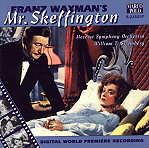Franz Waxman was the first to admit his stylistic debt to the great Russian composer Dmitri Shostakovich, and to Richard Strauss as well, and that made him the perfect choice to be the composer of this deliciously witty, vivacious score. Actually the music depicting the film’s (anti-)heroine, Fanny, is a modal tune remarkably like an English folk song, but Waxman develops it throughout the score in a convincingly symphonic manner, and the whole work has real continuity of thought, a quality so often lacking in movie music. In order to appreciate Waxman’s drolleries, it’s necessary to know something of the plot, which concerns a frivolous society heiress who marries a “nice Jewish boy.” Unwilling to give up the high life, even after the birth of her daughter, she ultimately loses her looks and her family, and finds herself facing old age alone. But since this story is, essentially, a sort of Hollywood fable, her husband (Mr. Skeffington) returns to her, old and blind, and she welcomes him with open arms. As annotator Bill Whitaker notes, it’s a very “Rosenkavalier-ish” story, with its sub-plot about the fear and loneliness of old age, as well as the sentimental ending. Simply to note that Waxman manages to find a musical counterpoint to every twist and turn of this very complicated script ought to be recommendation enough. In sum: a brilliant, magnificent piece of work, ideally presented by Stromberg and his Moscow players.
































